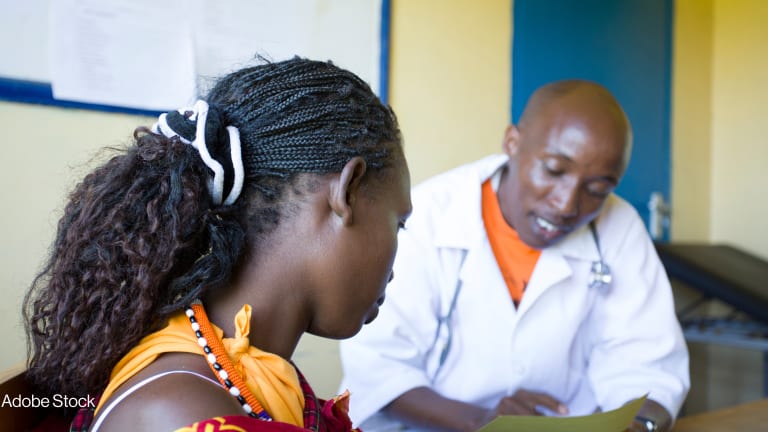
When good ideas and solutions sputter out during a predetermined project timeline, few people win. But when a project builds dependable systems and capacity in low- and middle-income countries so people there are empowered to continue the work themselves, the results can be game-changing, according to Devex interviewees. These dynamics can be summed up in a single word: sustainability.
Yet, despite sustainability’s clear and accepted significance — the Sustainable Development Goals speak directly to the concept — many projects fail to prioritize it during design and implementation, so projects end after donor funding has dried up without maximizing potential benefits.
More on Healthy Access
► Should governments see health care as an 'investment'?
► How to address UHC's age limit
► How can private partnerships help countries meet the UHC goal?
The need for more sustainable projects in the health sector has never been greater. Health challenges are multifaceted, interconnected, and enormously complex. Development assistance for health is under pressure as many foreign aid donors tighten budgets, and competition for scale and results is getting more fierce. Many developing countries entering middle-income status will graduate from foreign aid, despite persistent levels of health inequality and the rise of noncommunicable diseases.
So how can health projects achieve sustainability? Devex, in partnership with Smile Train — an international children’s charity that supports 100%-free cleft-repair surgery and comprehensive cleft care for children through partnerships with health care facilities around the globe — talked to experts and leaders from five prominent development organizations working across various areas of global health. These are the top four tips for creating projects built for long-term impact, gleaned from the full report, “Results That Last: Expert Insights on Health Project Sustainability.”
1. Prioritize sustainability from the beginning of a project
Of the people Devex spoke to, 39% said that sustainability is not considered or built-in at the design phase of many projects. That means that very few health projects establish sustainability principles and metrics during project design. For instance, project feasibility studies often fail to appreciate local cultural dynamics, or miscalculate initial levels of capacity, which influences the degree to which a project will deliver long-term intended benefits.
In fact, interviewees said that bringing in external expertise for just weeks or months at a time can undercut local knowledge development, while incentive-based projects — such as offering cash for vaccinations — often fail to create lasting change despite boosting short-term health outcomes.
“You can’t send in short-term providers and expect long-term, sustainable change that disrupts systems and disempowers the local health care professionals. It helps the patients who are treated in that one instance, but it leaves behind weaker systems for patients who weren’t treated, and the patients who will need care in the future,” said Susannah Schaefer, executive vice chair, president and CEO of Smile Train.
To tackle this, two-thirds of the interviewees suggest doing extensive research and community consultations before designing a new project, and considering the success factors of other evidence-informed interventions. That way, the idea of sustainability is present from the start of a project lifecycle and more likely to be achieved. Jeannie Annan, chief scientist at the International Rescue Committee, also believes measuring and monitoring from the piloting stage onward can help ensure critical elements are being delivered.
Interviewees also said that projects are more successful when integrated with other facilities or interventions, or when activities go beyond health services to improve the overall well-being of communities. For example, Action Against Hunger believes projects that integrate nutrition services with other sectors such as water, sanitation, and hygiene, or within the wider public health system, are more sustainable and scalable.

2. Empower a properly trained, motivated, and fairly compensated local workforce
Across the world, health projects struggle to attract, train, and retain health workers. The World Health Organization estimates a shortfall, primarily in LMICs, of 18 million health workers needed to achieve and sustain universal health coverage by 2030.
Devex interviewees note that in many contexts there are simply not enough qualified health professionals to sustain an intervention. They also note that projects often fail to provide the time and money for proper training and that it is difficult to keep health workers in the job once they are trained. Most community health workers are severely underpaid, and in some cases not paid at all, which leads to high attrition and turnover.
When community health workers leave the job, capacity and progress are often lost. A total of 96% of respondents stressed that effective capacity building and health workforce training underpin project sustainability.
To address this, interviewees suggested improving long-term mentoring, ongoing practical learning, and livelihood considerations. Training needs to be consistent, said Michelle Gayer, director of emergency health at IRC.
“I’ve seen this over and over again in the DRC right now, in the Ebola outbreak, you do a training in a facility one day and everyone has forgotten about it the next day. In order for a model to be really sustainable you need consistent training,” she said.
If resources are a barrier, inexpensive tools like laminated picture cards, lunch break learning among health workers, and peer-led support groups are ways to continue capacity building at little cost.
3. Facilitate more multisector partnerships, as they produce longer-lasting impacts
National and local government agencies are critical stakeholders that can facilitate, enable, and maintain health projects. Involving local governments removes obstacles to health care implementation and lends legitimacy to projects. Working with the ministry of health, for example, can catapult projects or issues onto the national agenda and enable a credible transition plan to local or national structures. Of the interviewees, 70% said that better coordination and collaboration with governments is essential for project sustainability.
“The best practice is to establish a system of supervision and support for health facilities that, over time, becomes ingrained in the community and continues once the externally funded project ends. For this reason, it is critical to always work with government health staff and not to replace them or create parallel systems,” said Lee Losey, deputy director of the CORE Group Polio Project, an initiative funded by the U.S. Agency for International Development made up of a consortium of NGOs supporting polio eradication in several countries.
4. Consider the broader health ecosystem
Socio-economic and security factors undermine sustainability. Insufficient transport options and high travel costs to and from health centers, for example, are serious barriers to health coverage in many LMICs. Insecurity and instability also impact sustainability.
Of Devex interviewees, 65% recommended taking the wider health ecosystem into account when designing health projects. For example, considering the inclusion of partners and stakeholders working across different sectors and issues can address some of the barriers to health access. Addressing individuals’ livelihoods and providing transportation options to patients can also bypass economic challenges and increase health coverage. Similarly, mobile clinics can supplement the work of existing health facilities and reach underserved communities.
“We have mobile units that move with the nomadic communities in northern Kenya and Somalia we call nomadic health clinics. The nature of these pastoralist communities is that they don’t stay in place. So you have to switch the intervention to their way of life,” said Ahmed Arale, CGPP secretariat director for Kenya and Somalia.
These four tips are just some of the many practical insights in “Results That Last: Expert Insights on Health Project Sustainability.”
To find out more about the role of women, technology and supply chains in project sustainability, read the full report here.

For a closer look at the innovative solutions designed to push for progress on universal health coverage around the globe, visit the Healthy Access series.








